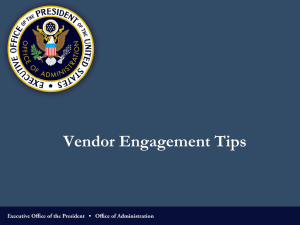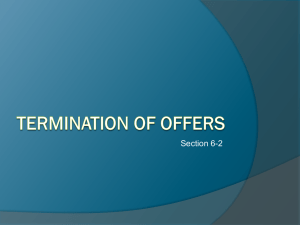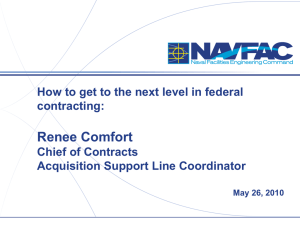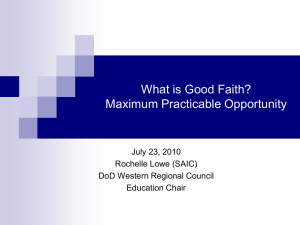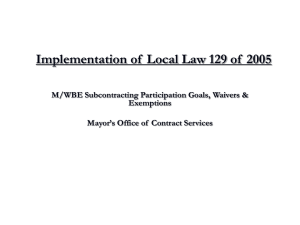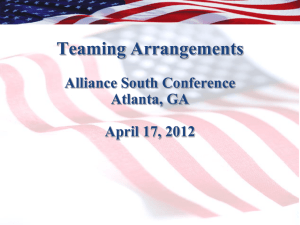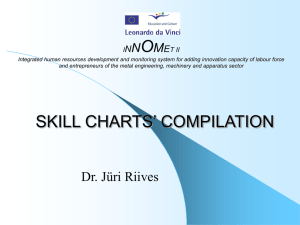Acquisition Process C5ISR Conference – Small
advertisement
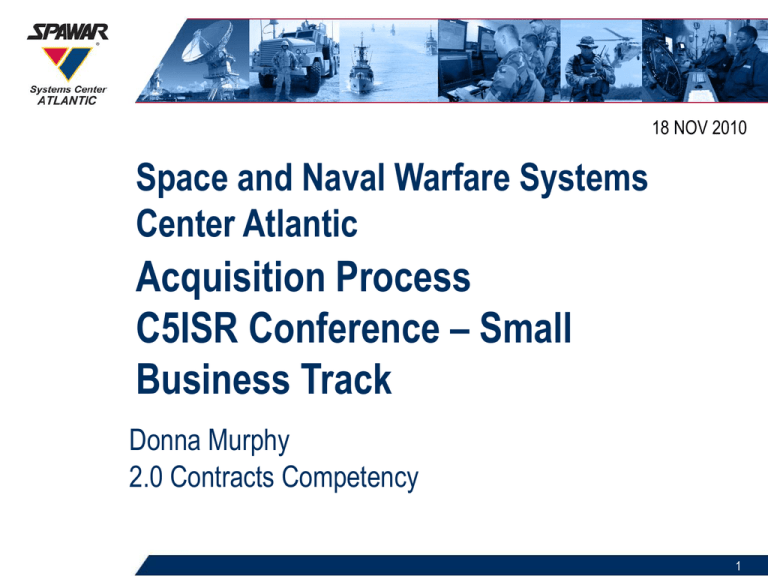
18 NOV 2010 Space and Naval Warfare Systems Center Atlantic Acquisition Process C5ISR Conference – Small Business Track Donna Murphy 2.0 Contracts Competency 1 1 Topics ▼ SSC-LANT Acquisition Process Overview of the e-Commerce Tool Relevancy of Market Surveys Small Business Subcontracting Plans Past Performance Requirements ▼ Questions 2 Overview of the Acquisition Process ▼ 5 Primary Phases Planning Solicitation Evaluation Award Post Award 3 Planning Phase START Acquisition Planning Contract Planning Conference Define Requirements Other than Full and Open Competition? Yes Justification & Approval (J&A) No Existing Contract? Contract Initiation Request / Approval Market Research AS / AP Guidance - Contract Types - CPC Baseline Procurement Request (PR) - Small Business Requirements / DD 2579 Sections B-M SOW/PWS/QASP Navy ERP / PD2 Request for Proposal (RFP) Development CDRLs DD 254 Federal Business Opportunities (FedBizOpps) Source Selection Plan Development 4 Solicitation Phase Synopsis (FedBizOpps) Finalize RFP Peer Review (if applicable) Issue RFP via E-Commerce Yes Amendments Needed? Issue RFP Amendments No Receipt of Proposals via E-Commerce Download Proposals Receive Hard Copy Proposals (As Applicable) 5 Evaluation Phase Review Proposals for Compliance Yes Discussions? Technical Evaluation Board (TEB) Kick-Off Source Selection Process No Establish Competitive Range Conduct Discussions Receive Final Proposal Revisions (FPRs) Evaluate FPRs Source Selection Authority Decision Business Clearance Approval 6 Award Phase Yes Issue Letters SB Notification? Contract Award Contract Distribution No No Public Announcement? Notice to Unsuccessful Offerors/ Debriefing Information Yes Defense Link News 7 Post-Award Phase Yes Is there a Protest? Yes Manage Protest Issue Task Orders IDIQ Contract? No Post Award Conference Perform Contract Administration Functions (DCMA/PCO) No Perform CPARS Evaluation(s) Contract Close Out 8 E-Commerce Tool URL: https://e-commerce.spawar.navy.mil/command/02/acq/navhome.nsf/ homepage?readform 9 E-Commerce Tool (Cont’d) ▼ Vendors User Guide Located on the left-hand side of the e-Commerce Central website Provides detailed information on system operation, user registration, etc. Highly recommend that you become familiar with the e-Commerce tool prior to responding to a SPAWAR requirement 10 Market Surveys ▼ Federal Acquisition Regulation (FAR) Part 10 Prescribes policies and procedures for conducting market research Market Research is required before soliciting offers for procurements above the simplified acquisition threshold (currently $150K) Market Research results are used to: − Determine if sources capable of satisfying the agency’s needs exist − Determine if commercial items are available to suit the agency’s needs 11 Market Surveys (Cont’d) ▼ Defense Federal Acquisition Regulation Supplement (DFARS) Part 210 Further Advises That Results Should Be Used To Determine If The Criteria In FAR Part 19 (Small Business Programs) Are Met Should the acquisition be set-aside for small business participation (i.e., is there reasonable expectation that at least 2 responsible small businesses within the assigned NAICS Code would submit offers with award at a fair and reasonable price)? Within the small business arena, do any of the preference programs apply (e.g., 8(a), HUBZone, SDVOSB, etc.)? 12 Market Surveys (Cont’d) ▼ Extent of Market Research Varies Based On Factors Such As: Urgency Estimated dollar value Complexity Past Experience Individual knowledge of market capabilities to meet requirements Publishing formal requests for information Querying available government databases Reviewing source lists for similar items Reviewing catalogs Conducting interchange meetings, presolicitation conferences, etc. ▼ Market Research Techniques Include: 13 Market Surveys (Cont’d) ▼ Market Research Results Should Be Documented In A Manner Appropriate To The Size And Complexity Of The Acquisition ▼ Who Performs Market Research? Acquisition Team: − Contract Specialist − Contracting Officer − Technical/Requirements Personnel 14 Market Surveys (Cont’d) ▼ Are There Specific Policies/Procedures Applicable To SPAWARSYSCEN Atlantic Procurements? Market Research is not required for Simplified Acquisition procurements; however, basic market research should be conducted to determine if commercial items are available to satisfy the requirement Formal Market Research Involves: − Posting a market survey/sources sought notice in Federal Business Opportunities (via e-Commerce) − Analyzing the market survey results to determine the appropriate acquisition strategy (e.g., full and open competition, small business set-aside, 8(a) set-aside, etc.) − Notification to respondents of market survey analysis results (new process) 15 Market Surveys (Cont’d) ▼ What Is Included In The Market Survey/Sources Sought Announcement? General description of the planned requirement − Supplies – List of equipment required and/or specifications − Services – List the various task areas of support services required, along with estimated percentage of each in terms of total effort − Applicable NAICS Code and Size Standard − General planned contract information (type, est $, etc) Interested parties are requested to indicate the percentage of work their specific company can perform as it relates to the individual task areas identified (only include information for your firm) 16 Market Surveys (Cont’d) ▼ What Is Included In The Market Survey/Sources Sought Announcement? (Cont’d) Interested parties are requested to submit documentation to substantiate that they possess the requisite capabilities to perform the applicable task area(s). Examples include: − General information about your firm (name, address, etc.) − Business size, annual revenue (past 3 years), etc. − Number of years in business − Points of contact − Affiliate information Standard template used 17 Market Surveys (Cont’d) ▼ What Is Included In The Market Survey/Sources Sought Announcement? (Cont’d) − List of customers with which you have performed similar work within the past 5 years (including a summary of the work, contract type, dollar value, relationship of work to the stated capability percentages, customer point of contact) − Information related to whether you have an approved accounting system or not (FAR 16.301-3 – cost reimbursement contract may be used only when the contractor’s accounting system is considered adequate for determining costs applicable to the contract) − Any other information pertinent for establishing capabilities 18 Market Surveys (Cont’d) ▼ Are There Guidelines For Determining Business Size? FAR Subpart 19.102 – Size Standards − Small Business size standards are applied by − Classifying the product or service being acquired in the industry according to the applicable North American Industry Classification System (NAICS) Manual (available via the Internet at http://www.census.gov/epcd/www/naics.html) − Identifying the size standard SBA established for that industry − Specifying the NAICS Code and Size Standard in the solicitation so that offerors can represent themselves as either a Large or Small Business − A procurement is classified in only one industry. If the requirement contains items/tasks covering multiple industries, the size standard accounting for the largest percentage of the contract price will be selected. 19 Market Surveys (Cont’d) ▼ FAR Clause 52.219-14 “Limitations on Subcontracting” By submission of an offer, the offeror agrees that in performance of the contract: − Service Contracts - At least 50 percent of the cost of contract performance incurred for personnel shall be expended for employees of the concern − Supply Contracts (except non-manufacturer) - The concern shall perform work for at least 50 percent of the cost of manufacturing the supplies, not including the cost of materials 20 Market Surveys (Cont’d) ▼ How is the Acquisition Strategy Determination Documented? DD Form 2579 (Small Business Coordination Record) Market research analysis results attached ▼ Who Approves The Acquisition Strategy Determination? Concurrence by the Contracting Officer and Small Business Office Review by the cognizant Small Business Administration Representative 21 Small Business Subcontracting Plans ▼ FAR Subpart 19.7 – The Small Business Subcontracting Plan Program Acquisitions expected to exceed $650K and that have subcontracting possibilities require the apparent successful offeror to submit a subcontracting plan Subcontracting Plans are not required: − From Small Businesses − For contracts/contract modifications that involve performance entirely outside the US and its outlying areas 22 Small Business Subcontracting Plans (Cont’d) ▼ FAR Subpart 19.704 – Subcontracting Plan Requirements Separate goals for small business, veteran-owned small business, service-disabled veteran-owned small business, HUBZone small business, small disadvantaged business, and women-owned small business Total dollars planned to be subcontracted, with further division to categories identified above Description of the principal types of supplies and services planned to be subcontracted Description of method used to develop subcontracting goals Description of method used to identify potential sources Statement regarding whether indirect rates were included in establishing the goals 23 Small Business Subcontracting Plans (Cont’d) ▼ FAR Subpart 19.704 – Subcontracting Plan Requirements (Cont’d) Point of contact for plan administration Description of efforts the offeror will make to ensure the various small businesses have an equitable opportunity to compete for subcontracts Assurances that the offeror will comply with flow-down clause requirements Assurances that the offeror will comply with applicable reporting requirements Description of records that will document plan compliance 24 Small Business Subcontracting Plans (Cont’d) ▼ FAR Subpart 19.705-4 – Reviewing the Subcontracting Plan Contracting Officer must review for adequacy as it applies to the particular acquisition − Comparison to previous acquisitions for same/similar work − Comparison to offeror’s historical achievements for same/similar work Goals should be set at a level that the parties can reasonably expect can result from the offeror’s good faith efforts to use the various small businesses to the maximum extent practicable Involve the cognizant Defense Contract Administration Agency (DCMA) in reviewing offeror’s past performance related to subcontracting efforts/achievements Obtain advice and assistance from the cognizant Small Business Specialist and SBA Procurement Center Representative (PCR) 25 Small Business Subcontracting Plans (Cont’d) ▼ Failure to negotiate an acceptable Subcontracting Plan will cause the offeror to be ineligible for contract award ▼ The approved Subcontracting Plan is incorporated into the contract Copies of the contract award are distributed to the cognizant: − SBA Office − SBA PCR − DCMA 26 Small Business Subcontracting Plans (Cont’d) ▼ What Happens After Contract Award? DCMA responsible for monitoring, evaluating, and documenting contractor performance in accordance with FAR Clause 52.219-9 (Small Business Subcontracting Plan) and FAR Clause 52.219-16 (Liquidated Damages) DCMA is to notify the contracting officer if, during contract performance, the contractor is failing to comply in good faith with the subcontracting plan DCMA provides final report at time of contract completion regarding contractor’s overall compliance with the subcontracting plan 27 Small Business Subcontracting Plans (Cont’d) ▼ How Is “Failure to Make Good Faith Effort” Defined? Contractor’s willful or intentional failure to perform in accordance with the subcontracting plan ▼ What Are Liquidated Damages? If the contractor has failed to demonstrate good faith efforts in complying with the plan, liquidated damages will be assessed The amount of probable damages is equal to the actual dollar amount by which the contractor failed to achieve each subcontracting goal 28 Proposal Evaluation ▼ Competitive Procurements Over $1M: Mandatory Factors − Corporate Experience − Past Performance − SB & SDB Participation (non-set asides) − Business Proposal Factors Optional Technical Factors − Personnel Qualifications − Technical Approach/Management Plan − Facility Information − Sample Tasks − Oral Interview 29 Proposal Evaluation (Cont’d) ▼ Corporate Experience Data: Corporate Experience data is to be submitted from the prime offeror and any proposed significant subcontractors for current contracts involving efforts similar and relevant to the requirements of the Request for Proposal ▼ Elements Currency Relevancy ▼ Method Prime and Significant Subcontractors Only Number of References Reference Information Sheet 30 Proposal Evaluation (Cont’d) ▼ Currency: Defined in Section L of the solicitation Sample definition: − Current contracts are considered to include work performed within the last five (5) years. ▼ Relevancy: Defined in Section L of the solicitation Sample definition: − Relevant is defined as a contract equal to or exceeding $5,000,000 (prime contractor) for efforts similar in scope to the requirements of this Request for Proposal. 31 Proposal Evaluation (Cont’d) ▼ Significant Subcontractor: Defined in Section L of the solicitation Sample definition: − A significant subcontractor is defined as a subcontractor (or teaming partner) that will be performing at least twenty percent (20%) of the total proposed labor hours. 32 Proposal Evaluation (Cont’d) ▼ Number of References: Defined in Section L of the solicitation Sample definition: − This data shall be submitted for at least one (1) but no more than three (3) of your most current and relevant contracts. This number applies to each team member, i.e., the prime contractor may submit data for no more than three (3) current and relevant contracts, and each significant subcontractor (or teaming partner) may submit data for no more than three (3) current and relevant contracts. If you do not have three (3) relevant Federal Government contracts, then provide data on state and local government or commercial contracts, in that order, to complete this report. 33 Proposal Evaluation (Cont’d) ▼ Reference Information Sheet: Provided as an Attachment to the RFP. Provides format for submission of Corporate Experience data. Includes “Experience Matrix” which contains those key PWS/SOW elements for which specific Corporate Experience information must be provided, along with the level of the offeror’s experience (i.e., prime or subcontractor). 34 Proposal Evaluation (Cont’d) ▼ How is Corporate Experience Evaluated? Evaluated to determine similarity to nature, scope, complexity, and difficulty to that which must be performed under the prospective contract contemplated by the solicitation. The more similar and relevant the work performed for the reference is to the contemplated work, the more valuable the experience is to the Government. The objective of the evaluation is to (1) determine the degree to which the offeror has previously encountered the kinds of work, uncertainties, challenges, and risks that it is likely to encounter under the prospective contract; and (2) develop insight into the offeror’s relative capability and the relative risk associated with contracting with the offeror. 35 Proposal Evaluation (Cont’d) ▼ How is Corporate Experience Evaluated? (Cont’d) Only those Contract References provided by the Prime and Significant Subcontractors will be evaluated. If reference information is provided by a subcontractor that does not meet the RFP’s definition of a “significant subcontractor”, that reference data will not be evaluated. Corporate Experience reference data is limited to companies that are expected to perform the planned effort (i.e., included in the technical and cost/price proposal data submission, with assigned labor category hours and teaming arrangements). Reference data for any company, division, subsidiary, etc., that is not included in the technical and cost/price proposal for the planned effort will be not considered. 36 Proposal Evaluation (Cont’d) ▼ How is Corporate Experience Evaluated? (Cont’d) Only those Contract References that are determined “relevant and current” will be evaluated. It is imperative that the offeror describe how the contract is relevant to the specific task elements contemplated on the proposed contract. If the Government is unable to determine the relevancy of the contract reference, the score may be adversely affected. 37 Proposal Evaluation (Cont’d) ▼ Past Performance Data Past performance information is to be provided for each of the contract references provided under the Corporate Experience element. Offerors that have no record of past performance (i.e., new businesses) must submit a signed and dated statement to that effect. ▼ Method Past Performance Questionnaire Contractor Performance Assessment Reporting System (CPARS) Past Performance Information Retrieval System (PPIRS) 38 Proposal Evaluation (Cont’d) ▼ Past Performance Questionnaire: Provided as an Attachment to the RFP. Provides format for submission of Past Performance data. Standard set of questions that address elements such as Quality, Schedule, Cost Control, Business Relationships, and Key Personnel Offerors forward the Questionnaires to the appropriate Agency POC’s for the contracts cited on the Reference Information Sheets. Agency POC’s evaluate the offeror’s contract performance for the various elements in accordance with the established rating scheme. Upon completion of the evaluation, Agency POC forwards the Questionnaire to the RFP’s designated Contract Negotiator. 39 Proposal Evaluation (Cont’d) ▼ CPARS & PPIRS If the Offeror’s Past Performance information is located in the (CPARS) or the Past Performance Information Retrieval System (PPIRS) (as indicated on the Reference Information Sheet), then it is not necessary for a Past Performance Questionnaire to be submitted. ▼ How is Past Performance Evaluated? The Government will assess each offeror’s and proposed significant subcontractor’s past performance. The assessment will be an unbiased, judgment about the quality of an offeror’s past performance. Past performance is a measure of the degree to which an offeror satisfied its customers in the past and complied with the statement of work, contract schedule and contract terms and conditions. Past performance is also a measure of the risk of performance associated with the offeror. 40 Proposal Evaluation (Cont’d) ▼ How is Past Performance Evaluated? (Cont’d) Evaluated for those Contract References cited under the Corporate Experience factor (i.e., Reference Information Sheet). Any Past Performance data received on a Contract Reference that has been determined “non-relevant” and/or “non-current” will receive a mid-point rating (i.e., “neutral” - evaluated neither favorably nor unfavorably). For offeror(s) that have submitted a certification statement that they are a “new business” and the Government has no information available regarding the offeror’s past performance, that offeror will receive a mid-point rating (i.e., “neutral” evaluated neither favorably nor unfavorably). 41 Proposal Evaluation (Cont’d) ▼ How is Past Performance Evaluated? (Cont’d) The overall score will be based on the average of contract responses received (or CPARS/PPIRS information available). The overall score will be normalized based upon the level of participation of the various team members. ▼ SB & SDB Participation Data: (Applies to full & open competitions) Offerors are to provide information related to the extent of participation with small and small disadvantaged businesses in performance of this contract. Offerors (large and small businesses) shall provide information concerning subcontracting, teaming or joint venture arrangements. 42 Proposal Evaluation (Cont’d) ▼ SB & SDB Participation Data: (Cont’d) Method − Small Business Participation Data Form. Provided as an Attachment to the RFP. ▼ How is SB & SDB Participation Evaluated? Offerors will be evaluated on the extent to which they identify and commit to small business and small disadvantaged business participation in the contract. This evaluation applies to large business proposals and small business proposals. The Small Business and Small Disadvantaged Business Offeror’s own effort will be considered in the evaluation of this factor. Large business participation whether as a prime contractor or a subcontractor will not be credited for Small Business Participation 43 Tips For A Successful Proposal ▼ Technical proposal does not simply reiterate the PWS requirements. Instead, information cites specific examples of work performed and how it meets and/or exceeds the current requirements What sets your company and/or proposed team apart from the rest? Remember – Demonstrating capabilities that “meet” the requirements is typically evaluated as a “satisfactory” or “acceptable” response. Demonstrating relevant capabilities beyond that set forth in the RFP is typically evaluated as “very good” or “exceptional” 44 Tips For A Successful Proposal (Cont’d) ▼ Be Realistic Have you appropriately planned for proposing on a requirement? Does your company have the requisite experience to successfully perform the requirement? Can you comply with any personnel qualification requirements? Can you comply with any facility requirements? ▼ Continue to check e-Commerce for the latest information 45 Tips For A Successful Proposal (Cont’d) ▼ Don’t wait until the last minute to submit your proposal Depending on file sizes and system capabilities, file transmission may take some time Make sure you are familiar with the e-Commerce proposal submission guidelines − User requirements − Register early! − Naming conventions If electronic proposal submission is not completed by the stated closing date and time, the offer will be considered “late” and will not be evaluated! − Reference FAR 15.208 for proposal submission requirements 46 Tips For A Successful Proposal (Cont’d) ▼ Check and double-check for errors ▼ Proposal rates are comparable to rates on file with DCAA ▼ Proposal is concise & relevant to the evaluation criteria ▼ Proposal complies with submission requirements and addresses all required elements ▼ Proposal offers innovative approaches to the task requirements that demonstrate value to the government ▼ Proposed Cost/Price is competitive ▼ Professional Employee Compensation Plan is compliant with RFP requirements 47 2.2 SSC LANT Organization Chart WILLIAM PAGGI CHIEF OF THE CONTRACTS OFFICE 2.0 Administrative Officer Kathy McLeland Non-ACAT Contracts 2.2 Donna Murphy ACAT Contracts 2.1 Command & Control Contracts 2.2.1 Kathy Breitkreutz 2.2.1.1 5.2 2.2.1.2 5.3 Business Systems/EIS Contracts 2.2.2 Audrey Orvin 2.2.2.1 5.1/5.9 2.2.2.2 5.4 2.2.2.3 NOLA DCAA LIAISON Connie Turner Policy & Strategic Initiatives 2.3 Kristy Penninger Comms & Networks Contracts 2.2.3 Steve Harnig 2.2.3.1 5.5 2.2.3.2 5.7 2.2.3.3 Tidewater Information Assurance Contracts 2.2.5 Lisa Rosenbaum 2.2.4.1 5.6 Requirements Development IPT Jim Crawley 2.2.4.2 5.8 48

